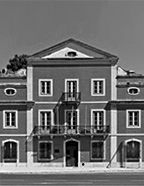

................................
For the Commemorations of the Foundation of Nationality, the following were prepared: "Documentos Medievais Portugueses [Portuguese Medieval Documents] published by Rui Pinto de Azevedo; Relatório acerca da localização da batalha de Ourique [Report on the location of the Battle of Ourique], by Lieutenant-Colonel Augusto Botelho da Costa Veiga; As origens do executor testamentário [The origins of the Executor of Wills], by Manuel Paulo Merêa; Memórias do Mosteiro de Pombeiro [ Memoirs of the Pombeiro Monastery] published by António Baião; Os forais medievais vimarenenses [ The Medieval Charters of Guimarães] by Alfredo Pimenta; Memórias do Mosteiro do Paço de Sousa [Memoirs of Paço de Sousa], published by the same academic; Crónica da fundação do mosteiro de S. Vicente de Lisboa [Chronicle of the foundation of the St Vincent Monastery of Lisbon] by Afonso de Dornelas. Commemorating the Restoration of Independence - Embassy of the Count of Vidigueira, Marquis of Nisa
- Original letters addressed to him by the Portuguese Government; Letters from the Governors of the Alentejo Province to King John IV and Letters from His Majesty King John IV, all published by Possidónio Mateus Laranjo Coelho; The Surrender of the Castilian Garrisons in 1640, by Captain Gastão de Melo de Matos; José Pinto Pereira, Administrator of the General Treasury of India and Overseas Counsellor to King John IV, by Captain Charles Ralph Boxer; Figures and Episodes of the Restoration, by António Rodrigues Cavalheiro and Luiz Pastor de Macedo; Letters from King John IV to King João da Costa (Count of Soure), by António Rodrigues Cavalheiro; Europe and Philippine Rule in Portugal, by António Rodrigues Cavalheiro and Luiz Vieira de Castro; People of the Islands in the Restoration War, by João Cabral do Nascimento; Portugal's Diplomatic Action at the Congress of Westphalia, by Eduardo Brasão and Brazil and the Restoration of Angola, by Gustavo Barroso”.
Meanwhile, academic life continued to display vitality, as can be seen in the minutes of the session on 4 September. They show that, on that date, the President of the Republic had already been presented with "... the first three published volumes... and the medal commemorating its foundation, by which act the Royal Academy of History was revived...". At the same session, chaired by Caeiro da Mata, he mentioned, as may be read in the respective minutes, "...the exceptional significance of how the President of the Council of Ministers had received copies of the same volumes and the aforementioned medal. Likewise, the Minister of National Education expressed words of praise for the Academy's activity, which pleased him greatly, as he had had the good fortune of being its resurrector". On 23 October, another step was taken towards normalising the institution and its academics by approving a diploma and an identity card.
